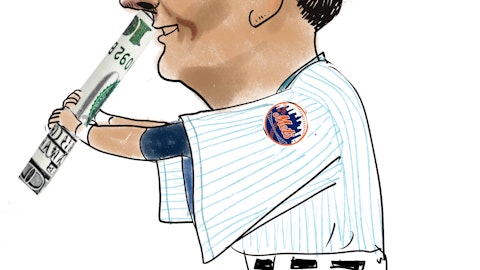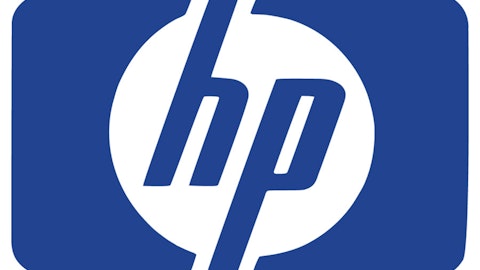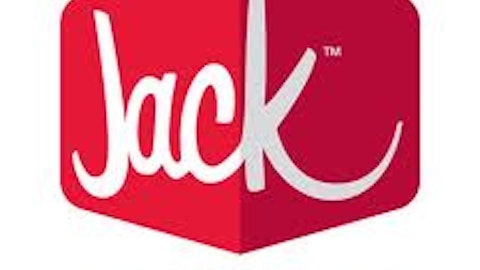Dunkin Brands Group Inc (NASDAQ:DNKN)’s Chairman, Jon Luther, sold off another 20,000 shares in a Form 4 filing last week. Since the beginning of September, Luther has reduced his direct number of shares owned by almost 11%—see all of Luther’s sales.
Luther’s recent sale of around 20,000 shares comes at an average of $30.80, with the company currently trading around $33. Granted, Dunkin is up over 30% year to date, versus the Dow Jones’s 10%, but is Dunkin overvalued enough to warrant such insider selling?
Dunkin is expected to grow revenues 8.1% in 2012, on top of an 8.8% increase in 2011. Strong growth should continue beyond that, with an expected 5-year average EPS growth rate of 16%, but we believe that perhaps the competition is too robust to support the company’s current stock price and expected growth. Dunkin also operates the frozen treats retail chain, Baskin-Robbins. However, the segment contributes less than 10% to revenue and is struggling to reduce its debt load.
Dunkin’s biggest battle in the coffee market is with the world’s largest coffee store retailer, Starbucks Corporation (NASDAQ:SBUX). Due to a slower global economy, the company has seen people trade down from Starbucks to the likes of Dunkin and Green Mountain. Yet, Starbucks is entering the at home premium coffee market to compete directly with Green Mountain Coffee—would Starbucks purchase Green Mountain? The single-cup segment is estimated to be an $8 billion market by S&P. Also, Starbucks is seeing positive same store sales despite a tough operating environment, with 2011 same store sales up 9%, driven by a 6% increase in traffic and 3% increase in average transaction price. This was in spite of 475 store closures due to the Borders bankruptcy.
However, in addition to Starbucks, Dunkin is seeing pressure from fast food giant McDonald’s Corporation (NYSE:MCD). The fast food chain has increased its menu offering, with the addition of various coffee products and smoothies. The company operates across a variety of geographical markets and should see continued positive growth as they cater to a variety of consumers. McDonald’s will continue to cause problems for fast food chains, smoothie shops and coffee stores; even amidst continued global weakness, the company expects to increase its net number of restaurants 2.4%
Other companies in competition with Dunkin include indirect competitor Green Mountain Coffee Roasters Inc. (NASDAQ:GMCR), and more direct competitor Tim Hortons Inc. (NYSE:THI). Green Mountain offers the convenience of quick coffee directly in the home or office, which has put pressure on Dunkin and other retailers, as people trade down during a weak economy. However, management recently lowered revenue and earnings guidance, but the company has shown strong growth prospects in emerging markets. The company is expected to grow EPS 20% over the next five years, versus an industry average CAGR of 15%. As well, the company trades at a relatively low P/E of 10, compared to other coffee companies. We are still wary and believe the company might be a value trap, especially as with Starbucks’ entry into their market, which may have a more profound impact than expected—and David Einhorn continues to pressure Green Mountain.
Tim Hortons’ is attempting to gain a larger presence in the U.S., which is bad news for Dunkin. The company, much the same as Dunkin, is a coffee and snack shop. The company is expecting revenues to be up 10% in 2012, on the back of 12.5% growth in 2011. New menu items, including smoothies and espresso-based drinks, should help drive this growth. Tim Hortons’ appears to be making key moves that will help grow the company but also move in on Dunkin and put a damper on Dunkin’s growth plans.
On a multiples basis, Dunkin trades well above two of its closest competitors, Starbucks and Tim Hortons. Dunkin trades at a P/E of 6.0, while Starbucks at a 2.8 and Tim Hortons 2.6. Both Dunkin and Tim Hortons will be going head to head in the great expansion race in the U.S., as Dunkin looks to expand westward and Tim Hortons looks to continue to expand from Canada into the Northeast U.S. We would rather not get into the middle of this battle, preferring to invest with a more dominant company at the time being. Assuming a continued slowing economic environment, we believe that McDonald’s will continue to perform well given its international diversity and ability to draw in a variety of individuals given its menu mix. The company also pays a 3.3% dividend and trades at a discount to its industry, at 17x earnings, versus the industry average of 21x. Continue reading here for a look at how the world’s most successful money managers are trading these stocks. We’ll give you a hint: big names like Steven Cohen and Cliff Asness are involved. Check it out.






